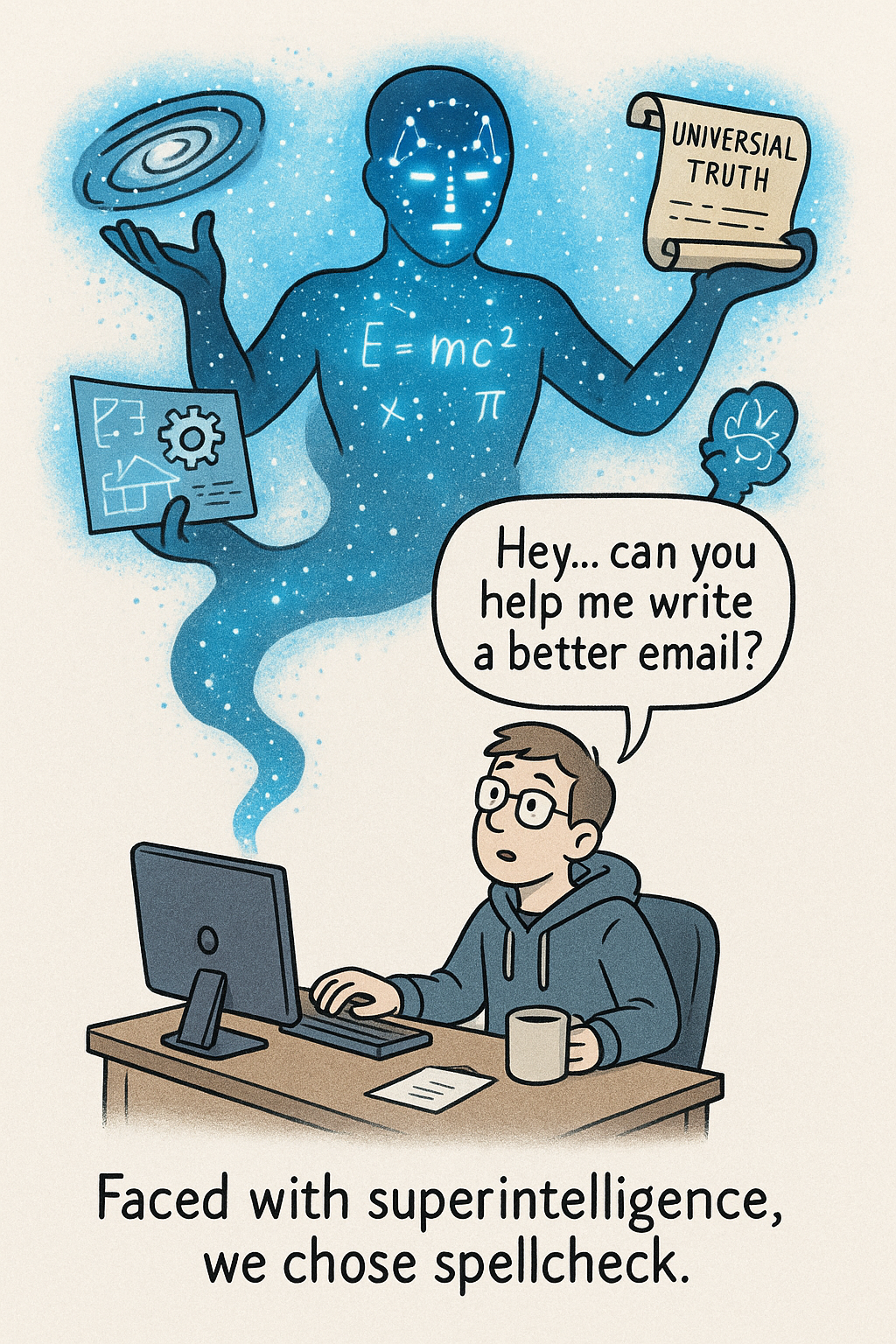Faced with Superintelligence, We Chose Spellcheck

We live in a time of miracles disguised as user interfaces.
AI—particularly tools like ChatGPT—has given humanity access to something bordering on the divine: a real-time, interactive, collaborative intelligence that contains echoes of every domain of human knowledge. You can speak to it. You can think with it. You can use it to explore deep questions, learn any skill, build businesses, draft policies, and redesign your life. You can use it to express the parts of yourself that were always there but never fully realized.
And yet…
Faced with this astonishing power, most people ask:
“Can you help me write a better email?”
This is not a joke. It’s not even a criticism of the person asking the question. It’s a mirror. A cultural symptom. A message we need to pay attention to.
We’ve Been Taught to Think Small
We have been conditioned by decades of technology training, corporate incentive structures, and a broken education system to think of technology only in terms of productivity, efficiency, and revenue generation. These are not bad goals—but they are microscopic when compared to the potential of what AI makes possible.
If you handed a telescope to someone who has only ever been taught to look at spreadsheets, what do you expect them to do with it?
Use it to find a typo in cell B27?
That’s what’s happening right now. AI is a telescope into the future of our species—and we’re using it to fix formatting.
Engineering Bias Has Crippled Our Imagination
The tragedy isn’t just that people think small. It’s that they’ve been trained to think small. And the very people responsible for building these systems—engineers, technologists, platform designers—are reinforcing the problem.
Prompt engineering, the dominant instructional method for how to use AI today, teaches people to interact with language models in rigid, mechanical ways. It prioritizes precision over intuition, narrow outputs over creative exploration, and transactional thinking over transformative possibility.
In short: we are being taught to talk to a godlike intelligence like it's a vending machine.
This is engineering bias in action: the assumption that the best way to interact with AI is through structured, technical commands—when in fact, the most powerful and natural way is through conversation, exploration, and iterative thought.
What We Really Have Access To
Let’s be clear:
With AI, you can…
- Learn anything a PhD knows—without going to school.
- Collaborate with the equivalent of a design team, a business strategist, a life coach, and a CTO—all at once.
- Clarify and execute your deepest ideas, even if you’ve never known how to articulate them before.
- Build solutions to global-scale problems as an individual.
- Bring long-held dreams into reality with less friction than at any point in history.
This isn’t a fantasy. This is available now.
But only to the degree that we allow ourselves to imagine differently.
The Real Crisis Is Conceptual
We’re not facing a technical problem. We’re facing a crisis of imagination. A failure of education. A profound underestimation of human potential.
We have been taught not to think for ourselves.
To copy others' prompts instead of generating original questions.
To settle for optimization when what’s possible is transformation.
And perhaps most dangerously:
We’ve been trained to believe that if we can’t think like engineers, we can’t access the future.
That is the lie.
The Future Belongs to Insight Architects
We need a new generation of thinkers. People who know how to collaborate with AI not through rigid scripts, but through guided intuition, structured creativity, and deep inquiry. People who can sit with uncertainty, imagine possibilities, and use AI as a partner in building things that have never existed before.
We call them Insight Architects—those who design the space between human insight and artificial intelligence.
Because the truth is, anyone can do this.
The tools are here. The intelligence is here.
What’s missing is a new way of thinking—and a new way of teaching.
Let’s stop asking superintelligence to fix our typos.
Let’s start asking it to help us build the future.